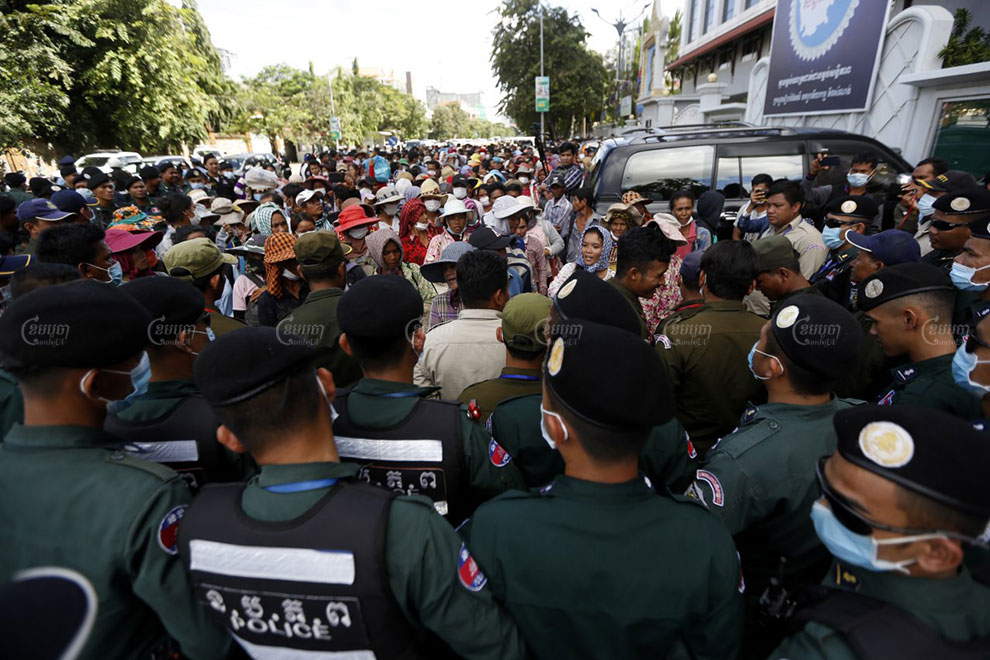Officials at the Land Management Ministry declined to accept a petition from nearly 1,000 protesters who had gathered outside the building on September 21 to demand a resolution to their long-running land disputes in several provinces.
The villagers from Koh Kong, Tbong Khmum and Svay Rieng provinces were demonstrating to mark the United Nations’ International Day of Peace, representing more than 7,000 families embroiled in conflicts over a total of more than 12,000 hectares of land.
However, Land Management Ministry representatives declined to meet the protesters, saying all of their disputes had already been settled.
After Land Management Minister Chea Sophara and other officials failed to meet the group or accept their petition, hundreds of the land dispute victims briefly blocked Monivong Boulevard just before 10:30am. Minutes later, riot police forced them onto the sidewalks and side streets to prevent traffic jams.
“According to the calendar, today is International Day of Peace, and for the whole of Cambodia it should be a day of peace and independence but we see that today there is no peace for those of us who are victimized,” said Yi Kunthea, 35, a protester who is involved in a land dispute with Koh Koh Sugar company in Botum Sakor district.
“We are the victims, that’s why we have come here,” she said. “But they did not come out to take our petition and they used police forces to harm villagers.”
Meanwhile, on September 20 at about 10pm, authorities in Koh Kong province’s Sre Ambel district stopped 12 minivans end route to Phnom Penh on National Road 48 in an attempt to prevent passengers from attending the protest, according to villagers.
One protester, Koy Yoeun, said that police had stopped her vehicle at about 10:30pm, only allowing the group to proceed at around 1am after checking driver’s licenses and registration documents.
She said that police had counted the number of passengers in the minivan and taken a picture of the license plate before allowing the group to travel to Phnom Penh.
“They had intended to prevent us,” Yoeun said.
“It is a violation of our rights because we have just come to show that our land has been lost,” she said.
Yoeun said she has been caught up in land dispute with tycoon Ly Yong Phat’s company Koh Kong Sugar since 2006, and lost 3 hectares of land in Botum Sakor’s Kandorl commune.
She said she has faced many challenges, including threats of imprisonment from local authorities when a group of families had submitted a complaint to the provincial hall demanding their land be returned.
“I am not afraid, because we have already lost our land,” she said.
Minister Chea Sophara and ministry spokesman Seng Lout could not be reached for comment.
In a statement issued the same day, the ministry said it had already resolved the four major land disputes between demonstrators and agricultural companies Heng Huy Agriculture Group, Koh Kong Sugar Plantation, Koh Kong Sugar Industry and Union Development Group. Nearly 800 more families had also made requests for social land concessions.
“To solve the demands of the five groups above, there are no legal instruments for the ministry to find a better resolution,” it said.
Sok Sothy Koh Kong provincial deputy governor and spokesman said that all land disputes with Koh Kong Sugar Plantation had been resolved since 2018, noting that a new group of villagers had started protesting recently with their own political agenda supporting the former opposition CNRP.
“The new group who has gone to protest in [Phnom Penh] said that they have no solution yet, but they are backed by a politician,” he said.
“They do not have a land dispute, so they came to protest following a political agenda,” Sothy added.
He explained that the 760 families who were involved in the dispute with Koh Kong Sugar Plantation had received 2 to 3 hectares of land and financial compensation of $1,500 to $3,000, while 197 families who had overlapping land claims with Heng Huy Company had also received settlements.
Soeng Senkaruna, senior investigator at rights group Adhoc, said that Land Management officials should have met with the protesters to accept their petition out of respect for their freedom of assembly.
“I think that the authorities should reconsider all of the problems if there is still no resolution that villagers can accept,” he said. “We are concerned that there is a lack of land for villagers to cultivate to support their livelihood.”
Chak Sopheap, executive director of the Cambodian Center for Human Rights, said the government should work on solving villagers’ land issues instead of attempting to stop their protests.
“While the legitimate and peaceful exercise of the freedoms of expression and assembly should be encouraged by the RGC rather than hindered, it should be noted that protests such as the one witnessed on 21 September 2020, would not be necessary if the land rights of Cambodians were adequately respected and protected by the RGC and third parties,” she said in an email. “The RGC needs to address land disputes by preventing future disputes, but also the timely and fair resolution of ongoing disputes.”








